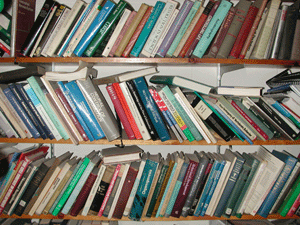Serendip is an independent site partnering with faculty at multiple colleges and universities around the world. Happy exploring!
Beyond the Walled Garden: "The World is Flat"
Thomas Friedman, The World is Flat: A Brief History of the Twenty-First Century.
Farrar, Stras and Giroux (2006; updated and expanded 2007).
Reviewed by Anne Dalke, Bryn Mawr College Department of English.
 |
 |
For the past six or seven years, I've been using a quirky nineteenth-century text, Edwin Abbott's Flatland: A Romance of Many Dimensions, as one of the key texts in a first-semester College Seminar @ Bryn Mawr on "Storytelling as Inquiry." The main trick of Flatland is the realization of the narrator that his one-dimensional world is actually his short-sighted perception of the three-dimensional one he actually inhabits. By the novel's end, to the dismay of the Sphere who has instructed him in the dimensions of the larger world, the narrator even begins to hypothesize that the world may exceed three dimensions.
So it was with great delight that, at the suggestion of a friend, I began reading Thomas Friedman's The World is Flat, which argues that the traditional hierarchies that have long structured our interactions with one another have been "flattened" by globalization. Friedman's central conceit reverses that of the 19th century Flatland. It is his argument that the playing field is now being leveled not just for countries and corporations, but for individuals: "it is now possible for more people than ever to collaborate and compete in real time with more other people on more different kinds of work from more different corners of the planet and on a more equal footing than at any previous time in the history of the world." That it is dangerous as well as empowering for individuals to collaborate and compete globally--that it enables terrorism as well as economic well-being--is not something Friedman shrinks from acknowledging, but the overall tone of his book is an intensely optimistic one, grounded in a hopeful attitude toward the transparency and positive directions made possible by the open market and political democracy.
Because I am writing this review on the Internet, and because I have gotten such pleasure from finding myself a "player" in this space, I was particularly intrigued by the portion of Friedman's book which focused on the revolution in connectivity that was enabled by various developments on the web. Of special interest was his discussion of the spread of the commercial web browser: "searching is empowering for humans like nothing else....It is the antithesis of being told or taught...to do what they think best with the information they want." Even more striking to me was Friedman's discussion of the evolution of the "intellectual commons" community that pioneered "open source" work--what he goes so far as to call "nothing more than peer-reviewed science." Friedman's description of what constituted good manners in the free software moment is compelling: to withhold code there "was considered gauche--after all, you benefited from the work of your friends, you should return the favor." The implications of this sort of approach to intellectual work are immense, and have me thinking about how I might better construct my classes, using an "'architecture of participation,' systems designed for users to produce, not just consume."
Friedman is an award-winning journalist for the New York Times, and he's got a way with words; he's a master at puns and quotable quotes. For instance, to represent "two competing forms of imagination," destructive and creative, he pairs 9/11 with 11/9, the day the (Berlin) wall came down. I often found myself laughing aloud @ the cleverness of his telling anecdotes--the naming (for instance) of the open-source web server Apache, both because (like the Apache tribe) they were taking on big government, and because "the APAtCHy server" was "patching all these fixes together."
Much of what Friedman calls attention to was obvious to me, once he'd said it, and much of it explains why I have found the Internet such a compatible place for my own work: "the Internet has magnified the capacity of individuals to generate their own stories and inscribe themselves on the world, both as individuals and as part of communities." There are other portions of Friedman's book which I found counter-intuitive, and so particularly intriguing. One was his discussion of "the coefficient of flatness: the fewer natural resources you...have, the more you will dig inside yourself for innovations in order to survive." In other words, out of a poverty of resources, out of necessity, can arise a wealth of imagination: "countries without natural resources are much more likely...to develop the habits of openness to new ideas, because it is the only way they can survive and advance."
Friedman's big book is well worth reading, because it is itself so expansive. It places classical insights--such as Marx's 1848 observations, in the Communist Manifesto, that "in place of the old local and national seclusion and self-sufficiency, we have intercourse in every direction, universal interdependence," in a contemporary context. And it places the local educational work of Serendip in a global one.



Comments
Serendip: local and global
globalocation
Post new comment